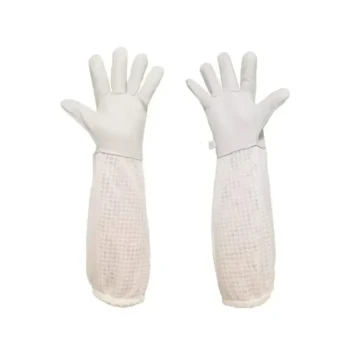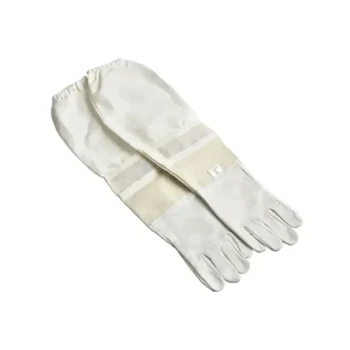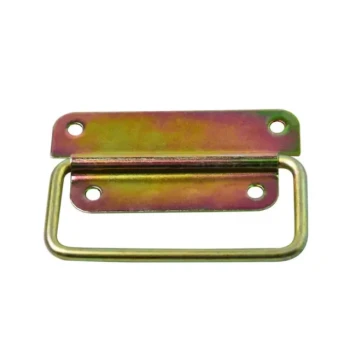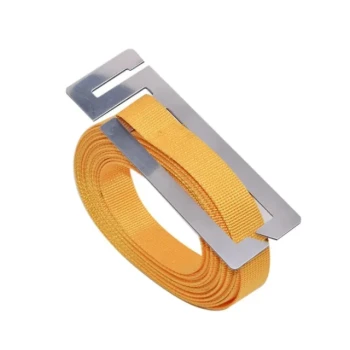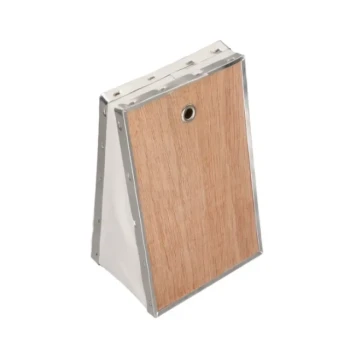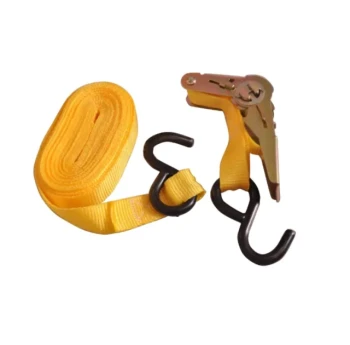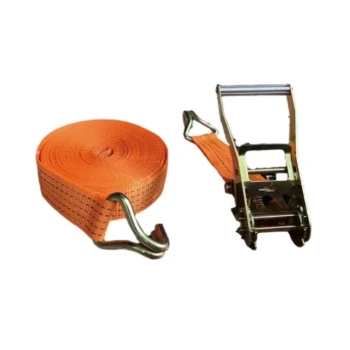For a beginning beekeeper, the recommendation is unequivocal. You should wear bee gloves every time you work with your bees. Wearing proper gloves helps significantly reduce nervousness and builds the confidence necessary to learn how to handle bees calmly and effectively.
The core reason for a beginner to wear gloves is not just about preventing stings—it's about managing your own psychology. By removing the immediate fear of being stung, you can focus on learning your bees' behavior and developing the smooth, deliberate movements that define a good beekeeper.
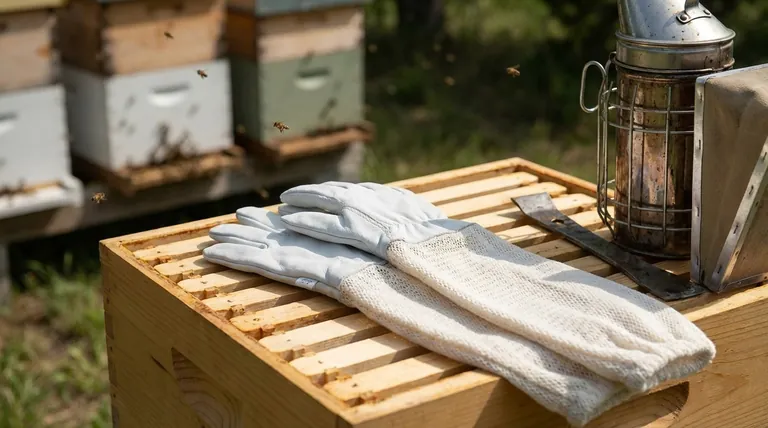
Why Gloves are Essential for Beginners
Starting your beekeeping journey requires focus and a calm demeanor. Gloves are a critical tool that helps you develop the right habits from the very beginning.
Building Foundational Confidence
For someone new to handling tens of thousands of stinging insects, confidence is key. Gloves provide a crucial layer of protection that allows you to work without the constant fear of being stung.
This mental safety net helps you concentrate on the tasks at hand, such as inspecting frames and identifying the queen.
Reducing Nervous and Jerky Movements
Bees often react negatively to sudden, jerky movements. A nervous beekeeper is more likely to make these kinds of motions, which can agitate the colony.
By wearing gloves and feeling more secure, you are naturally calmer. This promotes the slow, steady actions that keep bees peaceful.
Ensuring a Safe Experience
While learning, you are unfamiliar with what might disturb your bees. Gloves serve as your primary line of defense.
If you have a known or suspected allergy to bee venom, wearing thick, sting-proof gloves is non-negotiable for your safety.
Choosing the Right Gloves
Not all gloves are created equal. The right pair will offer protection without completely sacrificing your ability to work inside the hive.
The Critical Importance of Fit
Your gloves must fit comfortably. A pair that is too large will be clumsy, making it difficult to grip your hive tool or gently remove frames.
A pair that is too tight can restrict movement and may stretch the material, making it easier for a bee's stinger to penetrate.
Balancing Protection and Dexterity
You need gloves that are thick enough to prevent stings but flexible enough to allow you to perform delicate tasks.
It is highly recommended that you try on different styles and materials before purchasing to find the pair that best suits your hands and needs.
Understanding the Trade-offs
The choice of gloves involves a direct trade-off between maximum protection and the ability to feel and manipulate hive components.
The Downside of Thick Gloves
While thick leather or rubber gloves offer the best sting protection, they significantly reduce your sense of touch.
This can lead to accidentally crushing bees or handling frames more clumsily than intended, which can itself provoke a defensive reaction from the colony.
The Goal of Gaining Experience
Many experienced beekeepers eventually transition to thinner nitrile gloves or no gloves at all. They do this because they have developed the confidence and "feel" needed to work without agitating their bees.
As a beginner, you should view this as a potential future goal, not a starting point. Your initial priority is building a foundation of safety and calm.
Making the Right Choice for Your Start
Your initial choice of gloves should align with your primary goal as you begin your beekeeping journey.
- If your primary focus is maximum safety or you have an allergy: Choose a thick pair of leather or ventilated beekeeping gloves that extend up your arm.
- If your primary focus is building confidence and learning bee behavior: Standard beekeeping gloves are the ideal tool to remove fear and help you learn calmly.
- If your primary focus is balancing protection with dexterity: Ensure you try on several pairs to find one that offers good protection without feeling overly bulky or clumsy.
Starting with the right protective equipment empowers you to become a capable and confident beekeeper.
Summary Table:
| Aspect | Recommendation for Beginners |
|---|---|
| Wear Gloves? | Yes, unequivocally. |
| Primary Benefit | Reduces fear, builds confidence, and promotes calm movements. |
| Key Focus | Managing psychology to learn bee behavior effectively. |
| Glove Choice | Prioritize a comfortable fit that balances protection and dexterity. |
| Long-term Goal | Gain experience to potentially transition to thinner gloves later. |
Ready to start your beekeeping journey with confidence?
Equip yourself with the right gear from the very beginning. HONESTBEE supplies high-quality beekeeping gloves and protective equipment designed for commercial apiaries and distributors. Our wholesale-focused operations ensure you get durable, reliable gear that helps beginners build foundational skills safely.
Contact HONESTBEE today to discuss your beekeeping supply needs and let us help you build a confident start.
Visual Guide
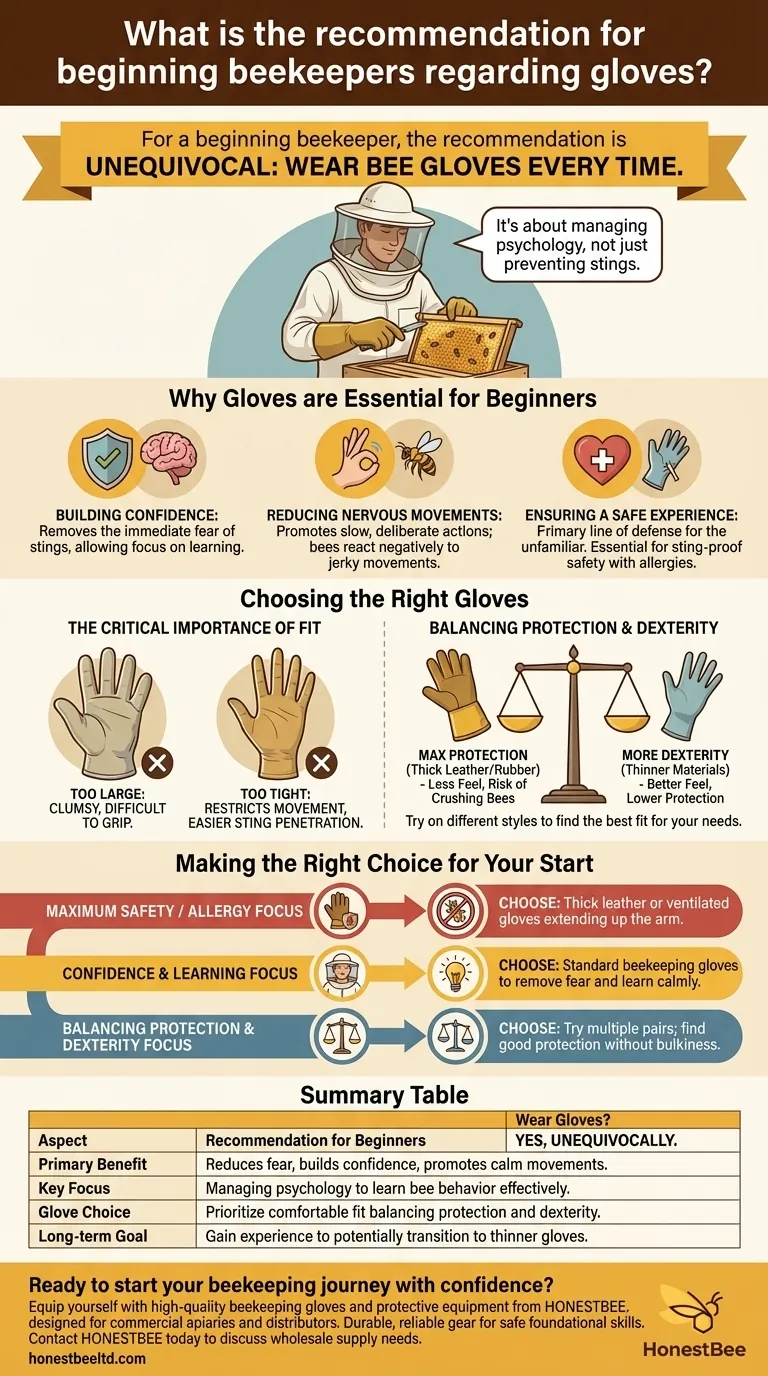
Related Products
- Premium Ventilated Goatskin Beekeeping Gloves with Full 3-Layer Mesh Sleeve
- Goatskin Leather Beekeeper Gloves with Vent Long Sleeve for Beekeeping Honey Bee Sting Proof Protection
- Goat Skin Leather Bee Sting Proof Beekeeping Gloves with Canvas Sleeve
- Professional Drop-Style Hive Handles for Beekeeping
- HONESTBEE Professional Long Handled Hive Tool with Precision Cutting Blade
People Also Ask
- What are the key factors to consider when selecting gloves for beekeeping? Balance Protection and Dexterity
- What are beekeeping gloves? Essential Protection for Safer Hive Management
- Why is it recommended to always have bee gloves available? Essential Protection for Unpredictable Hive Behavior
- Is it necessary to wear gloves with a bee suit? Essential Safety Guide for Beginners & Pros
- Why is it important to clean beekeeping gloves? Protect Your Hives & Extend Equipment Life
- When might a beekeeper decide to work without gloves? Master Hive Finesse and Dexterity
- Why do some experienced beekeepers opt not to wear gloves? Discover the Benefits of Tactile Precision
- What are the features of nitrile gloves for beekeeping? Precision & Hygiene for Modern Apiary Management
